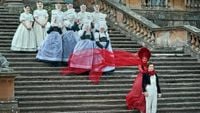The Venice Film Festival has long been a glamorous stage for cinematic debuts, but the 82nd edition, running from August 27 to September 6, 2025, is shaping up to be especially memorable. Among the star-studded premieres and the return of celebrated directors, one film is quietly stealing the spotlight: The Testament of Ann Lee, directed by Mona Fastvold and co-written with her creative partner, Brady Corbet. This unconventional musical about the enigmatic 18th-century religious leader Ann Lee, starring Amanda Seyfried, is not only a testament to artistic perseverance but also a family affair that encapsulates years of creative ambition, personal sacrifice, and festival tradition.
For Fastvold and Corbet, Venice has become something of a second home—or at least, a recurring summer destination. Their 10-year-old daughter, Ada, has now attended seven editions of the festival, a fact Fastvold only recently realized. "I feel like she’s grown up at the festival," she told Variety, underscoring the couple’s remarkable run on the Lido, where they’ve debuted four of the six films they’ve made together. Their most recent triumph, The Brutalist, premiered at Venice in 2024 and went on to sweep major awards, including three Oscars, four BAFTAs, and three Golden Globes. It’s an impressive feat for any filmmakers, let alone a pair so committed to telling stories that defy commercial convention.
Now, with The Testament of Ann Lee in competition, Fastvold steps into the director’s chair for what may be her most ambitious project yet. The film is described as a “speculative retelling” of the life of Ann Lee, the founder of the Shakers—a Christian sect that, in 1774, emigrated from the United Kingdom to America and established what Fastvold calls “the largest utopian society in American history with complete equality between men and women and all races and backgrounds.” Seyfried, who plays Lee, spent a year preparing for the role and sings on screen, possibly for the first time since Les Miserables in 2012.
But don’t expect a straightforward musical or a traditional biopic. As Fastvold explained to Variety, the film is “not a straight musical, nor a straight biopic.” Instead, it weaves together history, imagination, and music to explore the Shaker movement’s ideals of equality, communal living, and perfectionism. The Shakers, known for their utilitarian design and architecture, are now nearly extinct—only two members remain, largely due to their commitment to celibacy. Yet their legacy of collaboration and craftsmanship resonated deeply with Fastvold, who saw parallels with her own creative journey. “There’s something about doing things—like these very, very difficult films that nobody wants until they’re made—that really spoke to me as an artist,” she said, laughing. “There’s an obsession there.”
The making of The Testament of Ann Lee was itself a study in perseverance. Fastvold recalled that there was initially “zero interest” from the industry in her not-quite-musical, not-quite-biopic about an obscure religious leader. When Seyfried expressed interest in the role, Fastvold was blunt: “I will pay you nothing, you’re going to work very hard and it’s going to be a very uncomfortable experience for you.” Seyfried, undeterred, joined a cast that also includes Thomasin McKenzie, Christopher Abbott, Tim Blake Nelson, and Stacy Martin. The film was shot in Budapest, with Fastvold juggling post-production while simultaneously campaigning The Brutalist during awards season. “I was editing the whole time we were campaigning. I’d edit, edit, edit and then on the weekends would do Q&As with Brady,” she said, describing the whirlwind as both exhausting and exhilarating.
This relentless work ethic is something Fastvold attributes, in part, to what she admires about the Shakers: their “collaborative spirit” and their “laborious, near-fanatical pursuit of perfection.” It’s a drive that has sustained her and Corbet through years of challenging, often risky projects. “What are you going to do, spend four years directing a movie about superheroes?” she mused. “No offense to anyone who does, I’m sure it’s very fun. But there’s that obsessive, compulsive need to just create something… a little Shaker spirit. So we’re just gonna keep making our films.”
The Venice Film Festival this year is, as always, a magnet for Hollywood royalty. According to Vogue, the 2025 lineup features an array of A-listers—Julia Roberts, George Clooney, Cate Blanchett, Idris Elba, Emma Stone, and more—paired with anticipated films from directors like Luca Guadagnino, Guillermo del Toro, Jim Jarmusch, Noah Baumbach, Park Chan-wook, and Sofia Coppola. Yet, among these glitzy premieres, The Testament of Ann Lee stands out for its sheer audacity and its deeply personal roots. The film, shot in 70mm and almost an hour and a half shorter than the epic The Brutalist, is described by Vogue as “quite possibly the strangest and most intriguing film on this line-up.”
For Ada, the couple’s daughter, Venice is more than just a red carpet. She’s not only watched her parents’ films being made—often appearing as an extra—but has also experienced the highs and lows of festival life. Fastvold recalled Ada’s first time at the festival as a little girl during the premiere of 2020’s The World to Come: “She was little so was just doing cartwheels in the corridors outside.” By the time The Brutalist premiered, Ada sat through all three hours and thirty-five minutes of the film and its lengthy standing ovation. “She liked it—which was nice,” Fastvold noted, though Ada did cover her eyes during some of the less family-friendly scenes.
As for The Testament of Ann Lee, Ada has only glimpsed “bits and pieces of it in the edit,” Fastvold told Variety. “I’ve saved the whole experience for her in Venice.” It’s a fitting gesture for a family whose creative and personal lives have become so entwined with the rhythms of the festival. Whether or not the film matches the awards season success of The Brutalist, Fastvold and Corbet remain committed to their unique brand of filmmaking—one that values risk, collaboration, and a little bit of Shaker spirit.
While the glitz of Venice will always draw the world’s gaze, it’s the dedication, resilience, and quiet passion of filmmakers like Fastvold and Corbet that give the festival its soul. For them, and for Ada, the Lido isn’t just a stage—it’s a homecoming.



